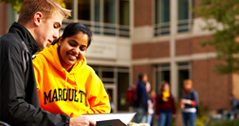The Cooperative Education Program
The Cooperative Education Program is an organized program integrating classroom work and practical work experience. Students in this program alternate periods of attendance at college with periods of employment in industry. The employment constitutes a regular, continuing and desirable element in the educational process. It is related to some phase of the field of study in which the student is engaged and should be diversified to afford a range of experience. The objective is balanced training; the combination of theory and practical work experience during the early years of professional development. The Engineering Cooperative Education Program (Co-op program) has been employed successfully at Marquette since 1919.
At Marquette, all students spend the first two years in the conventional academic program. Those not electing to participate in the Co-op Program continue through their last two years on the same conventional program. Admission to the Co-op Program is conditioned by: 1) the applicant’s academic standing; 2) his/her general employability, possibly including United States citizenship; and 3) the number of openings made available by industry. It should therefore be regarded as a privilege to be sought after, one usually gained only by those best qualified.
Early in the sophomore year, students attend an engineering orientation class, GEEN 2952 Professional Development for Engineers, to learn about the Co-op Program’s policies and procedures and the placement process. They then apply to the Co-op Program and pursue co-op placement by submitting resumes and interviewing with prospective employers. Students who are hired by co-op employers begin working during the summer or fall following completion of their sophomore year, or soon thereafter. The students participating in the Co-op Program are divided into three groups, which alternate between school and work on a planned basis. Typically, more than 230 students are in the Co-op Program at any given time and they are employed with more than 100 cooperating employers located in the Midwest and throughout the country.
Normal Co-op Schedule
| Year | Term | 16 mos. | 15 mos. | 12 mos. |
|---|---|---|---|---|
| Freshman | First Term | S | S | S |
| Freshman | Second Term | S | S | S |
| Sophomore | Summer Term | V | V | V |
| Sophomore | First Term | S | S | S |
| Sophomore | Second Term | S | S | S |
| Co-op Section | A | B | C | |
| Junior | Summer Term | S | W | V |
| Junior | First Term | W | S | S |
| Junior | Second Term | S | W | W |
| Pre-Senior | Summer Term | W | S | S |
| Pre-Senior | First Term | S | W | W |
| Pre-Senior | Second Term | W | S | S |
| Senior | Summer Term | S | W | W |
| Senior | First Term | W | S | S |
| Spring | Second Term | S | S | S |
S=School V=VacationW=Work Period
The approved training programs provide for rapid progress of the Co-op student through the various phases of the firm’s engineering processes, according to a planned schedule. The Co-op Program therefore gives the students an opportunity to combine their classroom learning with practical experience, it provides financial assistance to pay their education expenses, and it provides an orientation to both the world of work and career opportunities available. For the employers, the Co-op Program provides a ready-made training and recruitment program, it provides a good source of technical labor and it promotes college relations.
Since the cooperative education program is considered an integral part of a student’s education, the Co-op student is a full-time student at Marquette University; whether he/she is in school or at work. When the Co-op student is at work, he/she is under the company’s direct supervision. The student is subject to the rules of the company which may include background checks and/or drug screening. Wages are paid directly to the student. The university does not employ the student but cooperates with industry in arranging such employment. The Co-op Program provides one credit hour for each work period successfully completed. The Co-op student is required to follow an especially arranged Schedule of Classes while in school so as to accommodate his/her alternating status (in school, at work, etc.) and assure that sequential courses are scheduled in proper order. This includes summer sessions as noted on the Normal Co-op Schedule. Registration for each work period is required of all Co-ops, and credit is established and graded through enrollment in the appropriate Co-op Grading Period during the following school period. Three credit hours earned via Co-op work experience may be applied to Bachelor of Science degree requirements as a substitute for one technical elective course. For more information see the Co-op website.
The Noyce Scholar Teaching Cooperative Education Program
The national demand for teachers of science, technology and math (STEM) continues to grow. This program prepares interested undergraduates to become licensed teachers who can help meet the STEM-related needs of our increasingly global society through the effective education of middle and high school students.
The Noyce Scholar Program is based on an adaptation of the cooperative education model that has successfully prepared Marquette University engineers for 90 years into a similar program of preparation for engineering and science students desiring to become STEM teachers. Through this uniquely adapted cooperative education model, intensive field experiences in education (i.e., teaching co-ops) are integrated with classroom instruction to meet the Wisconsin state standards for STEM teacher licensure. This program allows engineering students to complete their engineering and STEM teaching degree requirements in 5 years and may be customized for any of the engineering majors. The approved STEM majors for Wisconsin teaching certification include: biology, broad field science, chemistry, physics and mathematics.
Teaching Co-op Schedule:
Sophomore
Spring EDUC 1210 Introduction to Schooling in a Diverse Society plus engineering course work
Summer EDUC 1220 Psychology of Human Development in Children and Adolescents in a Diverse Society (middle school)
Junior
Fall Teaching Co-op #1 (high school); EDUC 2037 Course EDUC 2037 Not Found; EDUC 2227 Introduction to Learning and Assessment; EDUC 4217 Children and Youth with Exceptional Needs
Spring Engineering and STEM course work
Summer Project Based Learning Experience
Pre-senior
Fall Engineering and STEM course work
Spring Teaching Co-op #2 (middle school); EDUC 4017 Teaching Middle/Secondary Science or MATH 3030 The Teaching of Mathematics; EDUC 4297 Teaching in the Middle School
Summer Engineering and STEM course work (as needed)
Senior
Fall Teaching Co-op #3 (middle or high school); EDUC 4965 Student Teaching: Middle/Secondary
Spring Engineering and STEM course work
Specific degree requirements for the secondary middle/secondary education and STEM teaching majors include:
| EDUC 1210 | Introduction to Schooling in a Diverse Society (Meets UCCS Diverse Cultures) | 3 |
| EDUC 1220 | Psychology of Human Development in Children and Adolescents in a Diverse Society | 3 |
| EDUC 2037 | Course EDUC 2037 Not Found | 3 |
| EDUC 2227 | Introduction to Learning and Assessment | 3 |
| EDUC 4017 | Teaching Middle/Secondary Science | 3 |
| or MATH 3030 | The Teaching of Mathematics | |
| EDUC 4217 | Children and Youth with Exceptional Needs | 3 |
| EDUC 4297 | Teaching in the Middle School | 4 |
| EDUC 4965 | Student Teaching: Middle/Secondary | 15 |
| Total Credit Hours | 37 | |
These degree requirements are addressed during the aforementioned teaching co-op experiences.
- Biology: see Major in Biology for the Professions
- Broad Field Science: see College of Education, Broad Field Science Major with Teaching Minors in Biology, Chemistry or Physics
- Chemistry: see Major in Chemistry for the Professions
- Physics: see Major in Physics
- Mathematics: see Major in Mathematics
Students must also complete HIST 1001 Growth of Western Civilization to 1715 or HIST 1002 Growth of Western Civilization since 1715 (meets UCCS Histories of Cultures and Societies) and any approved UCCS Literature and Performing Arts literature course.
For more information, see the STEM Education Co-op website.
Minor in Engineering Ethics and Values (ENEV)
The goal of this program is to involve engineering students in an elective program which will help them to: (a) understand the impact of Christian, Catholic and Jesuit values on engineering ethics, (b) recognize current engineering ethical issues and (c) strengthen their moral resolve to act courageously on these issues once they enter the engineering profession.
The minor in engineering ethics and values requirements include:
| Required Courses | 9 | |
| Philosophy of Human Nature | ||
| Theory of Ethics | ||
| Introduction to Theology | ||
| Four ENEV colloquia | 4 | |
| Ethics and Values Colloquium 1 | ||
| Ethics and Values Colloquium 2 | ||
| Ethics and Values Colloquium 3 | ||
| Ethics and Values Colloquium 4 | ||
| One of the following courses: | 3 | |
| Topics in Biomedical Engineering (selected sections only) | ||
| Decent and Affordable Housing | ||
| Health, Environment, and Infrastructure in Latin America | ||
| Two of the following courses: | 6 | |
| Topics in Biomedical Engineering (selected sections only) | ||
| Decent and Affordable Housing | ||
| Health, Environment, and Infrastructure in Latin America | ||
| Business and Its Environment | ||
| Philosophy of the Environment | ||
PHIL 3740 | Course PHIL 3740 Not Found | |
| Contemporary Ethical Problems | ||
| Business Ethics | ||
| Biomedical Ethics | ||
| Health Care Systems | ||
| Social Inequality | ||
| Introduction to Social Welfare and Justice | ||
| Christian Discipleship | ||
| Theology and the Natural Sciences | ||
| Foundations of Ecological Ethics | ||
| Medical Ethics | ||
| Total Credit Hours | 22 | |
For more information, see the assistant dean for academic affairs or the Engineering Ethics and Values website.
Concentration in Engineering Service
The Concentration in Engineering Service provides an integrated opportunity for engineering students to be involved in engineering-related service learning and reflection throughout their undergraduate studies. These experiences also provide an awareness of an engineer’s professional responsibilities to the community at large, and future opportunities for such involvement at the local, national and/or international levels.
This concentration requires completion of a minimum of 12 credits including:
| Local Service - Service-learning UCCS course - One of the following: | 3 | |
| Culture and Health (DC) | ||
| Introduction to Social Welfare and Justice | ||
| General Physics with Introductory Calculus 1 | ||
| The Psychology of Prejudice | ||
| Engineering Service courses: | ||
| CEEN 3720 | Decent and Affordable Housing | 3 |
| CEEN 4740 | Health, Environment, and Infrastructure in Latin America | 3 |
| International Experience: full-time study abroad (GEEN 9052) | ||
| International or Domestic Engineering Service project - One of the following: | 3 | |
| Independent Study in General Engineering | ||
| Senior Design Project | ||
| Civil Engineering Capstone Design | ||
| Senior Design Project | ||
| Senior Design Project | ||
| Senior Design Project | ||
Full-time study abroad placeholder course (GEEN 9052) | ||
| Engineering Service Seminar: | ||
| GEEN 2960 | Engineering Service Seminar | 0 |
| Total Credit Hours | 12 | |
Completion of these requirements will result in formal recognition of the Engineering Service Concentration on the student’s transcript.
For more information, see the Engineering Service website.
Concentration in Global Engineering
The profession of engineering is becoming increasingly global, including geographically distributed design teams, multinational companies and operations, global customer bases and markets, regional and international standards, culturally influenced approaches to research and development and a world-view of the environment. As a result, there is a need for students to develop a global perspective of their technical field and profession.
The goal of this program is to provide an integrated opportunity for students to experience engineering from a global perspective throughout their studies and provide formal recognition of these accomplishments via the completion of a concentration as noted on their transcript.
All engineering undergraduates in good standing are eligible to participate in this program. Students who wish to pursue this concentration should work closely with their academic adviser beginning in their freshman year to effectively integrate their interests and these experiences with their engineering degree requirements.
This concentration requires completion of a minimum of 13 credits including:
| Culture/Foreign language - One of the following: | 3 | |
| Survey of Latin America | ||
| Africa | ||
| Spoken Spanish | ||
| Study Abroad Experience: | ||
| ARSC 1005 | Cross-Cultural Issues in Study Abroad | 1 |
| ARSC 3005 | Bridging the Local and Global: Unpacking your Study Abroad Experience | 2 |
| Full-time Study abroad placeholder course (GEEN 9052) | ||
| International Engineering Project | 6 | |
| Independent Study in General Engineering | ||
And one of the following: | ||
| Senior Design Project | ||
| Civil Engineering Capstone Design | ||
| Senior Design Project | ||
| Senior Design Project | ||
| Senior Design Project | ||
| International engineering co-op /internship experience or international engineering service or research project - One of the following: | 1-3 | |
| Co-op Work Period 4 | ||
| Co-op Work Period 4 | ||
| Co-Op Work Period 4 | ||
| Co-op Work Period 4 | ||
| Co-op Work Period 4 | ||
| and the corresponding grading course: | ||
| Co-op Grading Period 4 | ||
| Co-op Grading Period 4 | ||
| Co-Op Grading Period 4 | ||
| Co-op Grading Period 4 | ||
| Co-op Grading Period 4 | ||
| or | ||
| Independent Study in General Engineering | ||
| Total Credit Hours | 13-15 | |
For more information, see the Global Engineering website.
Study Abroad Programs
Engineering students may study abroad with a Marquette-affiliated program, a Marquette-exchange program, a Marquette summer or intersession program or a non-Marquette program. Students are urged to contact the office of the assistant dean for academic affairs as early as possible for details. See also, this bulletin under Study Abroad Programs. The Office of International Education Study Abroad Resource Center is located in the Alumni Memorial Union, 425. For additional information, see the Study Abroad website. Also see Concentration in Global Engineering in this section of this bulletin.
Five-year Combined B.S./M.S. Programs
Each of the departments in the College of Engineering at Marquette University offers programs, which allow highly qualified students to complete a bachelor of science and master of science degree in five calendar years (six years for students enrolled in the Cooperative Education Program). By increasing course loads slightly in the junior year and/or by taking courses in the summer of the junior and/or senior years, qualified students may be able to complete the B.S. degree on schedule in four years and the M.S. degree at the end of five calendar years.
Students intending to pursue one of these programs should begin planning at the end of the sophomore year. Formal application to the program takes place during the second term of the junior year. See individual departments for details.
On this page
- The Cooperative Education Program
- The Noyce Scholar Teaching Cooperative Education Program
- Minor in Engineering Ethics and Values (ENEV)
- Concentration in Engineering Service
- Concentration in Global Engineering
- Study Abroad Programs
- Five-year Combined B.S./M.S. Programs
College of Engineering
- Degrees Offered
- Admission Requirements
- Majors Offered
- Graduation Requirements
- Academic Regulations
- Special Academic Programs
- Student Organizations
- Biomedical Engineering
- Civil, Construction and Environmental Engineering
- Electrical and Computer Engineering
- Mechanical Engineering
- Non-Engineering Minors
- General Engineering Courses




 Warning:
Warning:








